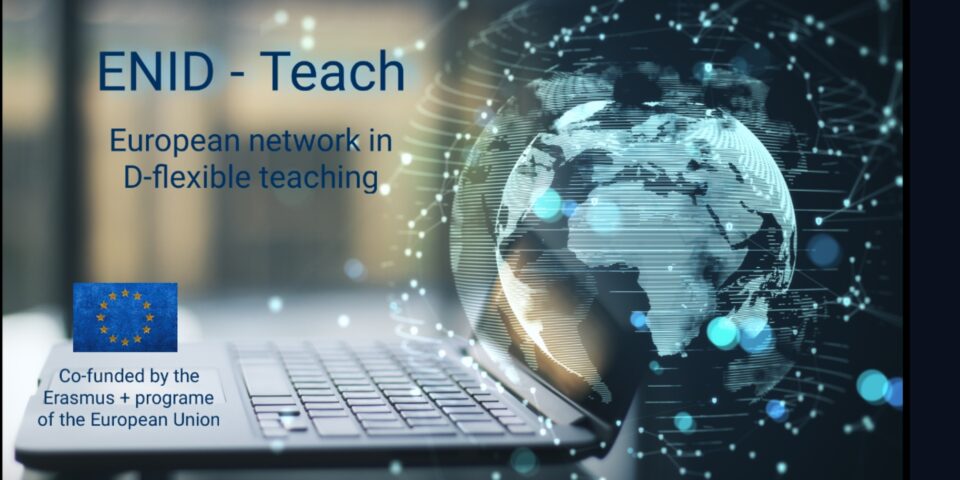The project
Context
Program Title: Erasmus+ Call: 2021
Key action: KA220-HED – Cooperation partnerships in higher education
Project Title: European network in D-flexible teaching (ENID-Teach)
Project Reference: 2021-1-ES01-KA220-HED-000027551
Partners
Universidad Nacional de Educación a Distancia [UNED] (Spain) (Coordinator)
Asociación Savoir*Devenir [S*D] (France)
Burgas Free University [BFU] (Bulgaria)
Universidade Aberta de Portugal [UAb] (Portugal)
Università degli Studi di Catania [UNICT] (Italy)
ECO Digital Learning, S.L. [ECO] (Spain)
MAG-Uninettuno s.r.l. [MAG] (Italy)
Project summary
The crisis caused by COVID-19 has imposed, on the one hand, social isolation in different degrees depending on the evolution of the pandemic and, on the other hand, the adaptation of the universities’ education system and learning processes to a digital model.
On the one hand, social isolation has caused the disappearance of inter-university networks which under normal circumstances would have been strongly cohesive. The aim of this project is to re-establish the university network that allows the strengthening of connections between European universities, focusing on the teaching staff as intra- and inter-university anchors which facilitate the constitution of a knowledge transfer network related to good digital and flexible teaching practices. On the other hand, serious deficiencies have been observed while adapting the education system to the situational needs that have been demanded by a digital and/or blended model. Sixty percent of universities claim to have adapted their systems to a digital model, but few had the capacity to respond fully to the crisis (Multirank, 2020).
One of the mistakes committed during the pandemic because of the urgency of the situation was to make decisions without a clear idea about what type of distance or blended learning model to implement. This led to the launch of stopgap measures and adjustments. In many cases, attempts were made to replicate the in-person model, onboarding digital environments but without any stable or consistent pedagogical design. It is unsurprising that, given the situation, institutions were caught short in providing a coherent and stable response. One of the reasons for this difficulty has been the lack of teachers digital training in flexible digital methodologies and pedagogies that might respond to these new needs.
The project will provide an answer to a common need detected across all the partner countries, i.e., the introduction of a learning programme specializing in online teaching methods that teachers can implement and adapt to their subjects and students. It will introduce innovative resources, tools and methodologies for a quality digital university education.
Why focus on teachers? Because we believe that the relationships established among university teachers act as weak ties (connections between acquaintances) that are the best source for acquiring new information. They are much more effective than if we rely only on strong ties which are formed by closer connections, with a greater degree of overlapping between members and, therefore, less likely to provide different information. Weak ties are fundamental for the growth and existence of groups. They constitute essential links for disseminating information, managing groups and building relationships. The project will provide a database of teachers with common interests (training in digital pedagogies) to the EPALE platform (community of practice and collaborative space), which will be configured as a communication tool and collaborative workspace in the construction of new quality pedagogical practices. This process will be complemented by digital networking and the expansion of the already initiated ReCoIn-TaD network (https://bit.ly/3g5FPiJ).
In short, the training of academics in innovative flexible pedagogies (Connected, Collaborative and Investigation, Active and Flipped) and in the creation of accessible and inclusive contents, through a methodology based on microlearning (microlessons and NOOC, NANO Open, Massive and Online Course) will facilitate the constitution of a network for the transfer and exchange of good practices capable of responding to different scenarios depending on the circumstances that may arise. Objectives
The main objective of the project is the digital training of academics in digital pedagogies, and the involvement of this community in building distributed but cohesive network of cooperation for the exchange of good practices and digital transformation.
The specific objectives are:
- Objective 1: Reinforce the design and outreach of flexible teaching practices that harness the resilience of university institutions to different pedagogical scenarios and facilitate educational access to disadvantaged groups.
- Objective 2: Provide online training to lecturers on flexible digital teaching practices (connected, collaborative and research, active and inverted) and the creation of accessible and inclusive content. To do so, we will harness a methodology based on microlearning (microlessons and Nano Open Online Courses) and on a critical, social, and network pedagogical model.
- Objective 3: Cement a model of European inter-university cooperation by creating a cohesive and distributed university network where teachers are posited as intermediary connection nodes (anchors) within and between universities for the exchange of practices in flexible digital teaching methods.
- Objective 4: Generate added value for the Erasmus+ program by offering an online training program in innovative digital methodologies that is multilingual (Spanish, French, English, Italian and Portuguese) and based on microlearning techniques (NOOCs). This will shore up lifelong learning and the recognition of official credits, and facilitate educational access to disadvantaged groups.
Management
The four main activities will have a leader, although the responsibility for their development rests with the entire consortium:
- A1.PROJECT MANAGEMENT UNED (Spain): brings the entire packet of activities described above.
- A2. Dissemination and promotion (Spain): creation the dissemination strategy and the dissemination plan (roles, responsibilities, calendar, actions …), as well as specifying dissemination actions (web, newsletters, press, conferences, publications, radio, etc.). The three organization are:
– specific campaigns on social networks (ECO Digital Learning),
– organization and enrichment of the project’s web space (https://recointad.com/) (MAG-UNINETTUNO)
– and EPALE shares (UNED and Savoir*Devenir) - A3.Exploitation (BFU): a sustainability and exploitation plan is designed which includes a set of actions to ensure maximum contacts and resources at the end of the project.
- A4.Evaluation of the project (UAb): it includes a set of activities that make the evaluation of the project possible, guaranteeing the monitoring of the progress and quality of the project. The quality plan of the Project is also included.
Implementación
Project execution will be collaborative and all partners. Alignment between partners is expected and the project objectives will be achieved in a collaborative manner.
The different supported activities are inter-related and will in some cases be developed in parallel and in others be the basis for implementing the next ones.
The project will develop six activities:
The project will develop six activities:
- Activity 1: Pedagogical design and preparation of the training program: led by Savoir*Devenir (France)
- Activity 2: Content development, digitization, integration, and production of the OERs: led by the MAG-UNINETTUNO (Italy)
- Activity 3: Content development, digitisation and NOOC integration and production: led by UNED (Spain)
- Activity 4: Microlearning Program Implementation: led by UNED (Spain)
- Activity 5: Microlearning programme evaluation: led by UAb (Portugal), which will carry out the design and development of the course validation plan
- Activity 6: Creation of a network of inter-university cooperation to generate flexible and innovative practices, will be carried out. It will be led by UNED (Spain)
Results
The tangible results are the intellectual efforts that come together to achieve the main objective of digital training in flexible pedagogies and in the creation of the cooperation network between academics. These outcomes are:
- R1. Training Programme on digital skills in Flexible and Innovative Methodologies: A microlearning programme in digital training in flexible and innovative pedagogies, which will consist of five multilingual NOOC (NANO Open, Massive and Online Course) (English, French, Italian, Portuguese, and Spanish).
- R2. NOOCs (NANO Open, Massive and Online Courses) in flexible methodologies: 1. Connected and critical; 2. Collaborative and research; 3. Active and gamified; 4. Inverted or Flipped; 5. Design of flexible learning digital programs.
- R3. Guide to good practices in flexible digital pedagogies. Based on the objective results, a guide to good practices in flexible digital pedagogics will be developed.
- R4. European network in D-flexible teaching: The main project goal is to develop an international distributed network of cooperation where teachers are configured as nodes that make inter- and intra-university connections possible and the dissemination of good, digital and innovative teaching practices.
- R5. Effectiveness research of microlearning based on NOOC which allows to advance a new way of learning through microlessons and in open environments. It will make it possible to reinforce new teaching methods on the basis of reliable scientific results.
The main intangible result is the generation of added value to the Erasmus + programme through the offer of this digital training programme. Participating academics will have improved their ability to work in teams, to organize themselves autonomously and to solve day-to-day problems of the teaching practice.
Green Footprint Strategy
The European Commission’s strategic long-term vision for Europe is to lead the transition towards a climate-neutral economy by 2050, that is, an economy with net-zero greenhouse gas emissions. In order to pursue this objective, the European Commission has launched several initiatives, policies and guidelines.
In line with this objective, the ENID-Teach partnership has adopted a Green Footprint Strategy, including concrete actions and good practices in order to implement the project with the minimal environmental impact.


